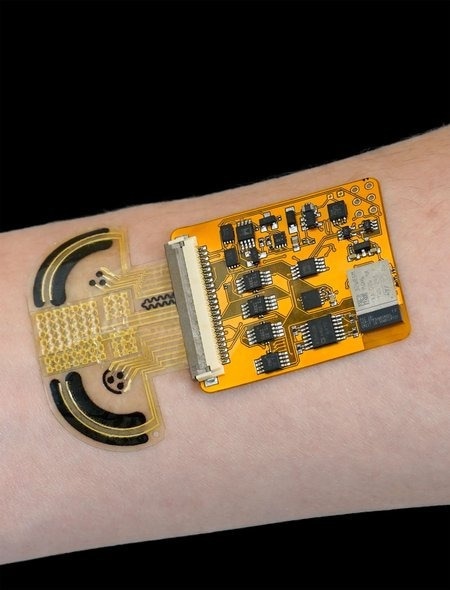
Fully integrated wireless CARES device. Image Credit: Wei Gao and Changhao Xu
It is possible to measure both baseline and acute levels of stress in people who wear CARES (consolidated artificial-intelligence-reinforced electronic skin), a small, thin adhesive that is worn on the wrist. During testing, the person who is wearing it is free to carry out all of their regular daily activities with little disruption.
Stress is a hard term to grasp. It is common to say “feeling stressed” or to describe a situation as “being stressful,” and the phrase “stress” is frequently linked to bodily symptoms, such as “I have a stress headache” or “I grind my teeth at night. Stress must be the cause.” Stress can refer to a wide range of emotions, signs, actions, and situations.
Hans Selye, a physician and chemist born in Vienna in 1907, was the first to identify stress as a medical disease. Selye was struck by the same complaints he heard from patients suffering from quite diverse ailments, such as weariness, low appetite, and lack of desire. He theorized that all of the patients were reacting to what they had in common: being sick. He described stress as a “nonspecific response of the body to any demand.”
Stress can be favorably perceived as exhilaration or energy or adversely as shock or worry. However, regardless of how stress is perceived emotionally, it is now commonly accepted that, depending on the degree and duration, both acute and chronic stress can harm physical and mental health and impair the ability to operate normally.
Stress, as Selye called it, is “nonspecific,” therefore there is no one biomarker that can tell conclusively whether or not a person is stressed. However, stress causes a series of physical reactions that, when combined, can offer a measure of stress independent of self-reports. Gao uses CARES to track this constellation.
When a person is under stress, hormones like epinephrine, norepinephrine, and cortisol are released into the bloodstream. Sweat becomes rich with metabolites like glucose, lactate, and uric acid, and electrolytes like sodium, potassium, and ammonium. These are substances we have measured before using microfluidic sampling on a wearable sweat sensor. What is new in CARES is that sweat sensors are integrated with sensors that record pulse waveforms, skin temperature, and galvanic skin response: physiological signals that also indicate stress in predictable ways.
Wei Gao, Assistant Professor, Medical Engineering, California Institute of Technology
New materials improve CARES’ performance even further. Though previously utilized sweat sensor materials could be easily made via inkjet printing and were capable of accurately measuring even rare components, they eventually degraded in the presence of physiological fluids.
A nickel-based chemical is introduced to help stable enzymatic-based sensors, such as those that detect lactate or glucose, and a novel polymer is added to ion-based sensors, which detect biomarkers such as sodium or potassium.
Gao noted, “Adding these new materials greatly enhances the sensor stability during long-term operation.”
CARES, like earlier sweat sensors, is battery-powered and uses Bluetooth to interact with a phone or computer.
Another significant advancement in CARES is the use of machine learning. Because stress manifests itself in a variety of ways and triggers a complicated reaction impacting a variety of biological systems, effectively interpreting a multitude of data is critical to the use of sensors like CARES. Experiments involving stress in people using the CARES device proved that the sensor properly assesses the interdependence of physiological (such as pulse) and chemical (such as glucose) indicators.
Subjects also filled out questionnaires to self-report their levels of anxiety and psychological stress before and after being exposed to stressful scenarios such as intensive exercise or intense video games. Data revealed substantial relationships between self-reported stress and its physicochemical correlates, as evaluated by CARES.
“High levels of stress and anxiety caused by demanding work environments, such as those experienced by soldiers or astronauts, can significantly affect performance. Early detection of the severity of stress allows for timely intervention. Our wearable sensor, combined with machine learning, has the potential to provide real-time stress-level insights,” Gao stated.
The study was published on January 19 in Nature Electronics. Changhao Xu (MS '20), Yu Song, Juliane R. Sempionatto, Samuel R. Solomon (MS '23), You Yu, Roland Yingjie Tay, Jiahong Li, Wenzheng Heng (MS '23), Jihong Min (MS '19), and Alison Lao of Caltech; Hnin Y. Y. Nyein of Hong Kong University of Science and Technology; and Tzung K. Hsiai and Jennifer A. Sumner of UCLA are the study co-authors.
The research was funded by NASA's Translational Research Institute for Space Health, the Office of Naval Research, the Army Research Office, the National Institutes of Health, the National Science Foundation, the National Academy of Medicine, and the Heritage Medical Research Institute.
Journal Reference
Xu, C., et. al. (2024) A physicochemical-sensing electronic skin for stress response monitoring. Nature Electronics. doi:10.1038/s41928-023-01116-6.